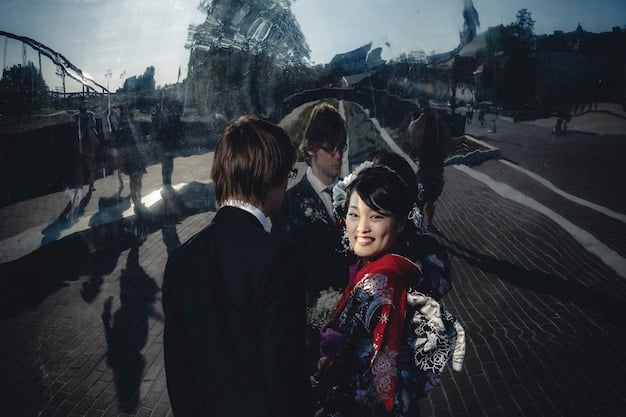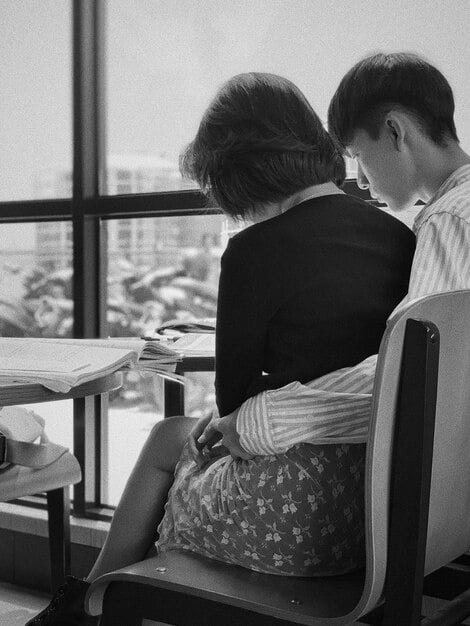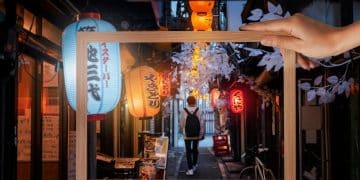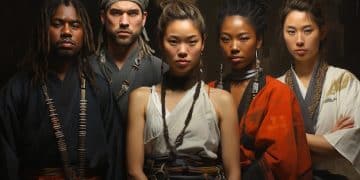Decoding K-Drama Tropes: Popular Themes and Why We Love Them

Korean drama tropes are recurring themes and scenarios that contribute to the genre’s unique charm, including love triangles, amnesia, and the ‘contract relationship,’ captivating audiences worldwide with their familiar yet engaging narratives.
Korean dramas, or K-dramas, have taken the world by storm, and a big part of their appeal lies in their use of Korean drama tropes. These recurring themes and scenarios, while sometimes predictable, create a comforting familiarity that keeps viewers hooked. Let’s delve into some of the most popular tropes and explore why they resonate so deeply with audiences.
The Inevitable Love Triangle
Love triangles are a staple in K-dramas, adding layers of conflict and emotional tension. Often, the main character finds themselves caught between two compelling suitors, each representing different aspects of what they desire in a partner. This tension fuels the storyline and keeps viewers guessing until the very end.
The Second Lead Syndrome
One of the most agonizing aspects of the K-drama love triangle is the “second lead syndrome.” This occurs when viewers develop a strong affection for the character who isn’t destined to win the main character’s heart. The second lead often embodies qualities like unwavering loyalty, kindness, and a genuine understanding of the protagonist.
Why Love Triangles Work
Love triangles are effective because they tap into our own anxieties and desires surrounding relationships. The viewer is essentially forced to consider “what if?” scenarios, imagining themselves in the protagonist’s shoes and weighing the pros and cons of each potential partner.
- Heightened Emotional Stakes: The competition for the main character’s affection intensifies the emotional investment.
- Character Development: Love triangles often force characters to confront their own feelings and priorities.
- Fan Engagement: Debates over who the main character should choose generates significant online discussion and engagement.
Ultimately, the love triangle, while sometimes frustrating, is a key element in the emotional rollercoaster that makes K-dramas so addictive. It allows for exploration of different relationship dynamics and often leads to significant character growth.

The ‘Chaebol’ and the Commoner
The trope of a wealthy heir (‘chaebol’) falling for a commoner is another frequently encountered element in K-dramas. This storyline explores themes of social class, privilege, and the power of love to transcend societal barriers. It’s a modern-day Cinderella story that appeals to our desire for upward mobility and romantic ideals.
Clashing Worlds
The inherent conflict between the chaebol’s opulent lifestyle and the commoner’s everyday struggles provides ample opportunities for drama and humor. The chaebol may initially struggle to understand the commoner’s values and way of life, leading to comedic misunderstandings and heartfelt moments of connection.
Overcoming Obstacles
The path to true love is rarely smooth in these dramas. Parental disapproval, corporate rivalries, and internal struggles often test the couple’s resolve. Their ability to overcome these obstacles together reinforces the idea that love can conquer all.
The appeal of this trope lies in its romanticism, as well as the social commentary provided during conflicts between characters.
- Escapism: This trope offers an escape into a world where social barriers can be overcome by true love.
- Social Commentary: These dramas sometimes critique the inequalities and pressures associated with wealth and power.
- Relatability: The commoner character often embodies relatable qualities like kindness, resilience, and a strong work ethic.
The ‘chaebol’ and the commoner trope allows viewers to explore the complexities of class differences while indulging in a heartwarming love story.
Contract Relationships: Love by Agreement
The “contract relationship” is an intriguing trope where characters enter into a formal agreement to be in a relationship, often for practical or strategic reasons. This unconventional setup creates a fascinating dynamic, blurring the lines between business and personal lives.
Reasons for the Contract
The motivations behind a contract relationship can vary widely. It might be to fulfill a family obligation, avoid unwanted attention, or achieve a specific career goal. The forced proximity and necessity for portraying real romantic affection leads to tension, laughs, and eventually genuine romantic feelings.
From Convenience to Connection
The beauty of this trope lies in the gradual evolution of the relationship. What begins as a purely transactional arrangement slowly transforms into something deeper and more meaningful. As the characters spend time together, they discover hidden depths and develop genuine affection for one another.

K-dramas highlight how two very different people can come together for reasons beyond romance, and show the audience how these situations can bloom into real, meaningful relationships.
- Forced Proximity: Being forced to spend extended time together allows characters to know each other better, even if they never intended to.
- Breaking Down Walls: As the characters work together, they slowly break down personal walls of insecurity that eventually bring them closer together.
- Unexpected Romance: The contract can lead to feelings that characters might not have been open to, due to other obligations or responsibilities in their lives.
The contract relationship trope is compelling because it explores the idea that love can blossom in the most unexpected circumstances.
Amnesia: The Reset Button
Amnesia is a classic K-drama trope that introduces dramatic stakes and forces characters to confront their pasts. The loss of memory can create both conflict and opportunity, allowing the characters to rediscover themselves and their relationships.
Losing the Past
Amnesia often serves as a catalyst for major plot twists. It can erase painful memories, create misunderstandings, or even hide dark secrets. The character affected by amnesia must then navigate a world where their identity and relationships are shrouded in uncertainty.
Second Chances
While amnesia can be devastating, it also offers a chance for a fresh start. Characters can reinvent themselves, make new choices, and build relationships without the baggage of their past. This can lead to personal growth and a renewed appreciation for life.
Amnesia is generally used to create drama, but it can also lead to the resolution of several conflicts, even for side characters. It usually offers the characters involved a fresh perspective and a second chance at love.
- Suspense and Mystery: The mystery surrounding the lost memories creates suspense and keeps viewers engaged.
- Reinvention: Amnesia allows characters to break free from their past mistakes and forge a new path.
- Emotional Impact: The struggle to remember and reconnect with loved ones evokes strong emotional responses from viewers.
Amnesia can be a powerful storytelling device, enabling K-dramas to explore themes of identity, memory, and redemption.
The Piggyback Ride: A Moment of Vulnerability
The piggyback ride is a seemingly simple trope with deep significance in K-dramas. It often signifies a moment of vulnerability, trust, and growing intimacy between characters. The act of carrying someone on your back represents care, support, and a willingness to bear their burden.
Symbolism of Support
The piggyback ride often occurs when one character is physically or emotionally vulnerable. The other character’s willingness to carry them symbolizes their willingness to support them through difficult times. It’s a gesture of kindness and compassion that strengthens the bond between them.
Intimate Proximity
The physical closeness of a piggyback ride creates a sense of intimacy and connection. The characters are forced to rely on each other, fostering a sense of trust and shared experience. This moment can be a turning point in their relationship, signaling a shift from friendship to romance.
Because K-dramas are full of heart-wrenching plots and dramatic situations, the piggyback ride tends to be a symbol of support, even friendship. It provides the characters with an opportunity to connect on a different level and get through hard times together.. It typically signifies that a deeper personal relationship will eventually develop.
- Non-Verbal Communication: The piggyback ride conveys emotions and intentions without the need for dialogue.
- Physical Comedy: The scene can often be humorous, especially if the character giving the ride is struggling to carry the other.
- Romantic Undertones: The piggyback ride can be a subtle yet powerful expression of romantic interest.
The piggyback ride, while seemingly insignificant, is a recurring visual cue that represents growing intimacy and emotional support between characters.
Terminal Illness: The Ultimate Sacrifice
The trope of terminal illness adds a layer of tragic inevitability to K-dramas. It forces characters to confront their mortality and make difficult choices about how to spend their remaining time. This trope often explores themes of love, loss, and the preciousness of life.
Time is Running Out
The knowledge that time is limited intensifies the emotional stakes of the drama. Characters must grapple with their own mortality and the impact their illness will have on their loved ones. They often make sacrifices to ensure the happiness and well-being of those around them.
Living in the Moment
Terminal illness can also serve as a wake-up call, prompting characters to appreciate the present moment and pursue their dreams. They may embark on adventures, mend broken relationships, or simply cherish the time they have left with their loved ones.
Even if the illness is never “cured” in the drama, these characters find the strength to persevere with their lives or protect the ones they love with their remaining time. It can be a sad, yet powerful testament to the strength of the human spirit.
- Emotional Catharsis: Viewers can experience a cathartic release of emotions through the characters’ struggles and triumphs.
- Moral Dilemmas: The illness often forces characters to make difficult choices with no easy answers.
- Reflection on Life: This trope encourages viewers to reflect on their own values and priorities.
The terminal illness trope, while often heartbreaking, can be a powerful exploration of the human condition, highlighting the importance of love, compassion, and living life to the fullest.
| Key Element | Brief Description |
|---|---|
| 💔 Love Triangles | Protagonist caught between two potential partners, leading to emotional turmoil. |
| 💰 Chaebol/Commoner | Wealthy heir falls in love with a commoner, challenging social norms. |
| 📝Contract Relationships | Characters date to fulfill an obligation, eventually developing real feelings. |
| 🤕 Amnesia | Character loses their memory, leading to new challenges and second chances. |
Frequently Asked Questions
▼
Love triangles create dramatic tension and allow for exploration of different relationship dynamics, keeping viewers engaged by creating competing fantasies of who the protagonist will chose to be with.
▼
It offers an escapist fantasy where love transcends social class, while also offering commentary on societal inequalities and the power of human connection, as well as romance.
▼
While highly dramatized, they explore the idea that love can blossom in unexpected circumstances, and that people can find love regardless of how they met.
▼
Amnesia is a plot device used to create suspense, mystery, and the opportunity for characters to reinvent themselves or resolve conflicts. It gives writers a blank slate to explore new avenues.
▼
It symbolizes support, trust, growing intimacy, and the willingness to carry someone’s burdens, both physically and emotionally. It’s a physical display that provides comfort to viewers.
Conclusion
Korean dramas have woven a rich tapestry of familiar tropes that captivate audiences worldwide. From the anguish of love triangles to the transformative power of amnesia, these themes resonate with our deepest emotions and desires. Whether you’re a seasoned K-drama enthusiast or a curious newcomer, understanding these tropes will enhance your appreciation for the unique charm and storytelling prowess of this beloved genre.





